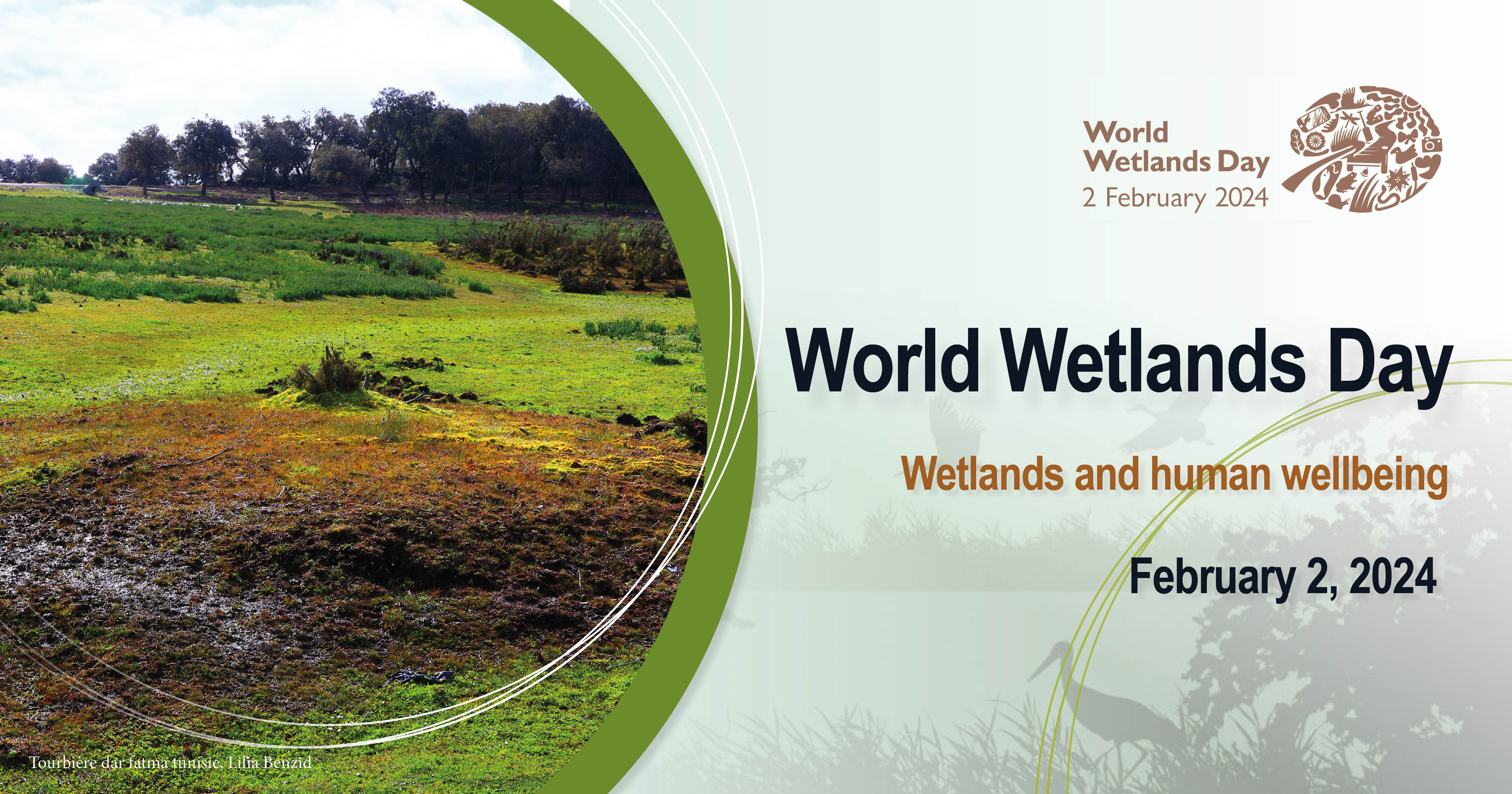World Wetlands Day "Wetlands, Sources of Human Well-being," February 2, 2024

Ms. Kaouther HAMROUNI
Doctoral Thesis in Agronomy
February 2, 2024 is the day the Sahara and Sahel Observatory celebrates the World Wetlands Day proclaimed by the United Nations General Assembly in 2021. This celebration is dedicated to raising public awareness of the pressing need for reversing the trend of accelerated disappearance of these ecosystems and promoting sustainable measures for their conservation and restoration.
This Day commemorates the signature of the Convention on Wetlands, on February 2nd, 1971, in the Iranian city of Ramsar on the Caspian Sea. It is an opportunity for all nations and people to come as one, join forces and take action for wetlands.
This year’s slogan for the day “wetlands and human well-being” highlights the historical interconnection between these ecosystems and human life. Indeed, populations draw the livelihood, inspiration and resilience from these productive environments.
Wetlands are vital for humans and for maintaining the balance of other ecosystems and play an important role in mitigating extreme climate phenomena. They regulate water regimes, i.e. the recreation of groundwater, habitats for migratory birds as well as the storage of carbon in different forms. This contribution proves that the value of the ecosystem services they provide is much higher than the value of terrestrial ecosystems.
They also have a great cultural, scientific, recreational and economic value that would be five times higher than the value of tropical forests that will be absolutely irretrievable if they were lost. Even though they only cover about 6% of the earth's surface, 1/7th of the world's population depends on them and 40% of all plant and animal species live or reproduce there.
Globally speaking, wetlands are disappearing three times faster than forests and are the most threatened ecosystem on the planet. They are on the verge of completely disappearing, with only 13% of the land they used to cover remaining. Their decline has accelerated with the loss of 35% of their surface area over the last 50 years. With the climate causes and anthropogenic practices such as urbanization, the drainage of deltas and the change to cultivated land, nobody really expects the situation to return to the previous levels anytime soon.
By walking through thousands of records of drainage and land use change, researchers from Stanford, Cornell and McGill universities (Fluet-Chouinard et al., 2023) came to the conclusion they published in the Magazine ‘Nature’ that at least 3.4 million km2 (21%) of the wetlands had been lost from 1700 to 2020, the equivalent of India.
Africa is home to large areas of wetlands that are highly important for their global contribution to ecosystem services, and the hundreds of millions of rural communities that directly depend on them for their livelihoods. The role of these ecosystems in mitigating climate change is increasingly recognized, and African countries have made remarkable progress in developing conservation and management policies. Fifty African nations have thus signed the Ramsar Convention on Wetlands, with 425 Ramsar sites.
As part of its new ten-year strategy (2021-2030) focused on Water, Earth, Climate and Biodiversity, the OSS is committed to supporting its member countries in the implementation of their environmental policies and the sustainable and climate-resilient economic development.
This strategy includes initiatives such as the “Regional COoPEration for New Indicators of Ecosystem Natural Capital Accounting in Africa – Copernicea” project in partnership with six African countries (Burkina Faso, Guinea, Morocco, Niger, Senegal and Tunisia). This project evaluates several aspects including the value of the ecosystem services and carbon sequestration of wetlands using the Ecosystem Natural Capital Accounting - ENCA - method.
On the occasion of the release of "The 2024 African Economy" to which the OSS contributed with its expertise, a conference (lien) was organized by the AFD on January 25, 2024 and focused on the macroeconomic prospects of Africa to overcome funding shortages as well as the challenges of managing the continent's natural resources, making economic growth and environmental preservation go hand-in-hand.
"What future do African ecosystems have?" was written by the OSS experts and published in this release and highlights the importance of ecosystem accounting and AfrikENCA Accounts (lien) which provide a true foundation for decision-making and the development of policies aimed at preserving African biodiversity.
At the same time, as part of the “Improving IWRM, knowledge-based Management and Governance of the Niger Basin and the Iullemeden-Taoudéni / Tanezrouft Aquifer System | ITTAS” project, the OSS is working on the joint management of surface and groundwater in the Niger basin.
Finally, with the “Restoring North Africa's wetlands as a nature-based solution to improve water and food security (Restore NAW)” project, the OSS is stepping up its efforts for the restoration of wetlands to improve the water and food security in North Africa.
